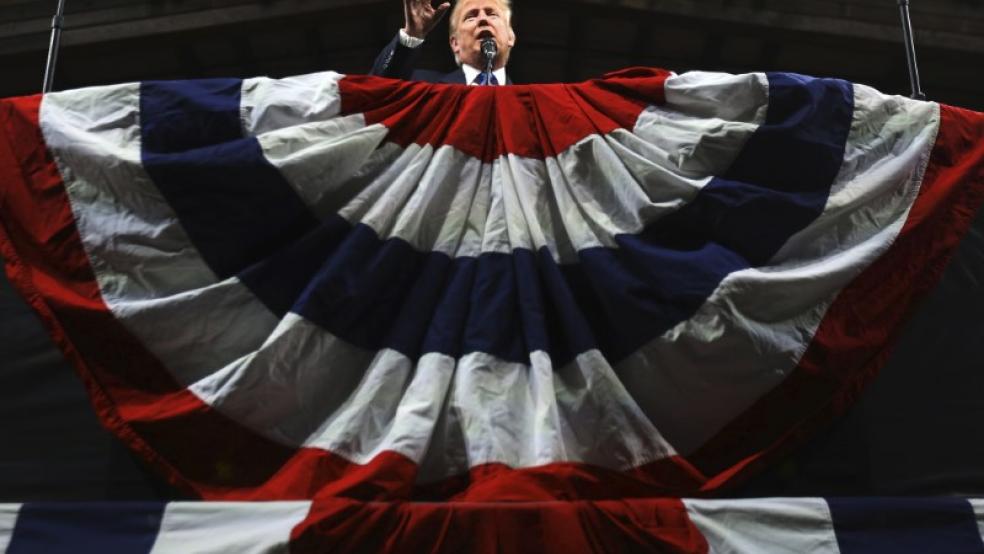It takes a lot of confidence to think that you can gamble on offending half the population of the United States and still win a general election campaign for president, but Donald Trump is not a man who is short on confidence. That was never truer than it was following his blowout victories in all five Republican primaries last night.
In a long post-election speech and press conference at Trump Tower in Manhattan, he declared that he sees himself as the GOP’s “presumptive nominee,” even though he has still not reached the critical milestone of 1,237 pledged delegates that would guarantee a first-ballot nomination at the Republican Convention in July. He also signaled that one of his main lines of attack against Hillary Clinton, whose four victories out of five last night make her the de facto Democratic nominee, would be the fact that she is a woman.
Related: Trump Keeps Defying Predictions and His Own Advisers
“I think the only card she has is the women's card,” Trump said last night. “She has got nothing else going. Frankly, if Hillary Clinton were a man, I don't think she would get 5 percent of the vote. And the beautiful thing is, women don't like her.”
While Trump already runs weaker among women than he does among men, he received at least 50 percent of the women’s vote in the three states where the major television networks conducted exit polls. He won 50 percent in Maryland, 54 percent in Pennsylvania and 55 percent in Connecticut.
To many political commentators, the idea that Trump would suggest that a woman who is a former first lady, former senator, and former secretary of state is only considered electable because she is a woman looks politically suicidal. But on Wednesday morning in an interview with CNN, he doubled down.
“She is a woman. She is playing the woman card left and right,” she said. “She didn't play it last time with Obama. But she's playing it much harder this time, and she will be called on it. If she were a man and she was the way she is, she would get virtually no votes.”
Related: Bye-Bye Bernie? Sanders Vows He’ll Keep Fighting but Clinton Is Moving On
Now, there is no arguing that so far in this election, at least when it comes to reading the Republican primary vote, nobody has done it better than Trump. Time and again, he has defied expectations, building a huge lead in delegates — his 988 right now put him 420 ahead of his closest rival, Texas Sen. Ted Cruz — and blowing through supposed “ceilings” in his favorability numbers.
The question coming away from last night and Trump’s follow-up interviews this morning is whether the decision to go after Clinton on the “woman card” issue marks Trump’s pivot to the general election or is simply another piece of red meat to throw to the conservative base that will be voting in Republican primaries like Indiana, California, and New Jersey, where big wins would seal the nomination for the former reality television star.
If it’s the latter, there’s plenty of time for Trump to shift to criticism of Clinton that’s a little more nuanced than “she’s a girl.” However, if this signals how Trump intends to compete in the general election, well, his advisors are going to need to start ordering heartburn medication by the crate.
The Republican primary electorate looks very different from the general electorate in a presidential year, and a candidate who has already alienated huge segments of the population — Hispanics, Muslims, immigrants — really can’t afford to gamble on losing a large share of an entire gender as well.
Related: Trump’s Vice President? Expect the Unexpected
No doubt, someone in Trump Tower has been designated to deliver that message to The Donald. But, as we learned recently from Trump’s abortive attempt to be more presidential, he doesn’t take kindly to being told what to do in this campaign. If he feels that attacks on the “woman card” are serving his interests, they will surely continue.
Trump is unpredictable, and he likes it that way. In a political word where being on message and highly disciplined are considered a huge plus, Trump sees them as annoying and inhibiting.
On CNN Wednesday morning, he stressed that he believes it is important to preserve flexibility in how he responds to his opponents. “I may tone it down, or I may tone it up. I can’t tell you what I’m going to do. I don’t know...I will determine when I see how the other people punch back.”





